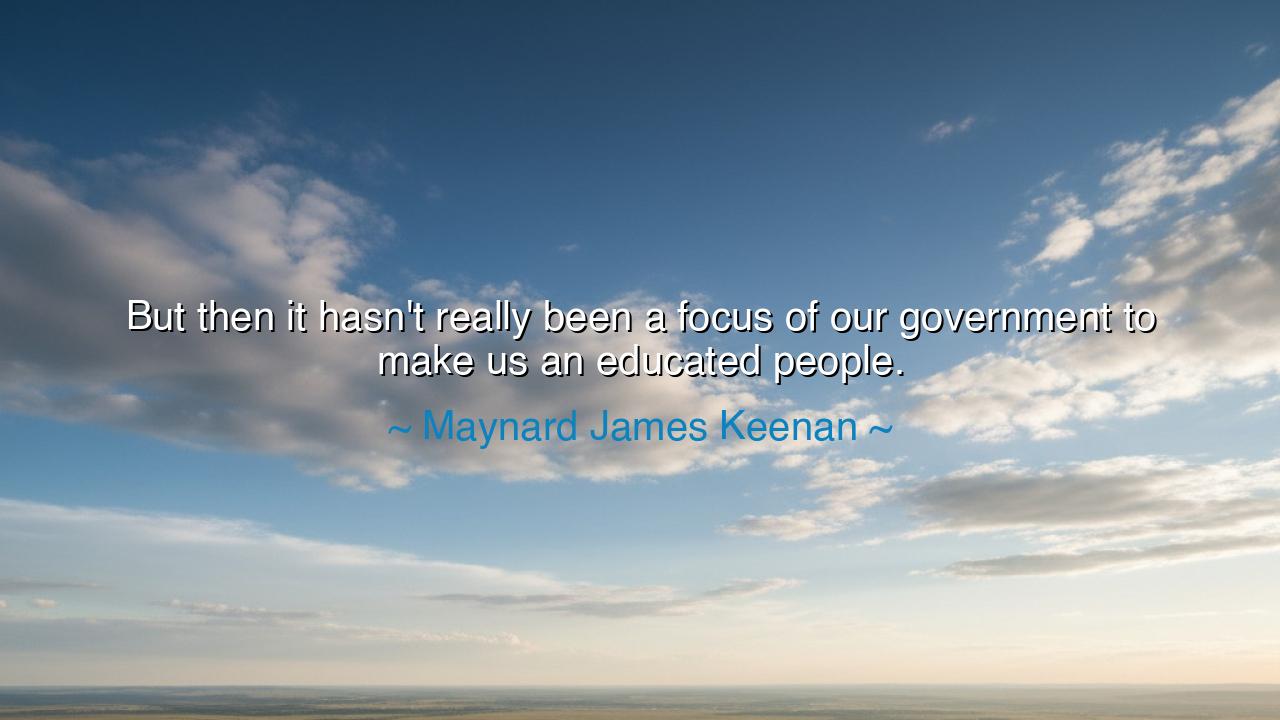
But then it hasn't really been a focus of our government to make
But then it hasn't really been a focus of our government to make us an educated people.






In an age of noise and illusion, when the screens of the world glow brighter than its truths, the musician and thinker Maynard James Keenan spoke a line that cuts through the fog of complacency:
"But then it hasn't really been a focus of our government to make us an educated people."
Though simple in its phrasing, this statement strikes at the root of a profound and unsettling truth — that ignorance, left unchallenged, serves power better than wisdom does. Keenan, known for his artistry and sharp intellect, was not speaking merely as a critic of policy, but as a seer of patterns — one who perceives that the failure to cultivate an informed and discerning citizenry is no accident. His words are a lament, a warning, and a challenge all at once: to awaken, to question, to remember that education is not a privilege granted by rulers, but the birthright of every free soul.
The meaning of this quote runs deeper than a complaint about schools or curricula. It speaks of the deliberate neglect of true education — the kind that awakens thought rather than obedience, that teaches individuals not what to think, but how to think. For when the people are ignorant, government rules easily; when they are wise, it must serve humbly. A population trained only to work, consume, and repeat the words of authority is no longer a community of citizens — it is a flock awaiting command. Keenan’s words unveil this ancient tension between knowledge and control, a struggle as old as civilization itself.
The origin of this struggle can be traced back to the dawn of organized power. Throughout history, those who sought dominion understood that knowledge is the seed of rebellion. In ancient Egypt, priests controlled writing, for to read was to possess sacred power. In medieval Europe, kings and clerics kept the Scriptures in Latin, ensuring that the common man could only hear, never interpret. And in every empire since, education has been shaped to serve the needs of the ruling few. As the philosopher Francis Bacon once said, “Knowledge is power.” But what he did not say — what Keenan reminds us — is that those who hold power often fear to share knowledge, lest it set others free.
Consider the example of Frederick Douglass, born a slave in America, who risked his life to learn to read. “Once you learn to read,” he wrote, “you will be forever free.” The masters knew this too — that literacy breeds thought, and thought breeds freedom. Thus they forbade it. Douglass’s story reveals the eternal truth behind Keenan’s words: that education is liberation, and those who wish to rule without accountability will always seek to dull the minds of the people. When governments fail to make education their focus, it is rarely out of neglect — it is often out of design. For an enlightened populace is difficult to manipulate, and a questioning spirit cannot be easily ruled.
But Keenan’s insight is not meant to breed despair. It is a call to action — a call to reclaim the power that was always ours. For though institutions may fail, the pursuit of knowledge lies within every individual’s reach. The educated person is not merely one who holds degrees, but one who hungers for understanding, who listens deeply, reads widely, and questions bravely. The true scholar is the one who sees beyond the surface of the world — who recognizes propaganda when it wears the mask of truth, and who values learning as an act of rebellion against ignorance.
There is a quiet heroism in those who educate themselves against the current of apathy. In every age, they have existed — from Socrates, who questioned the very foundations of Athenian thought, to Malala Yousafzai, who risked her life for the right to learn. Each of them understood what Keenan’s words imply: that the freedom of a people depends not on the benevolence of their rulers, but on the courage of their thinkers. Education is not something given — it is something taken, fought for, and defended, generation after generation.
Thus, the lesson is clear: do not wait for governments to make you wise. Seek wisdom yourself. Read what they do not teach. Ask the questions they do not encourage. Speak of what they would rather you forget. For every time a citizen chooses curiosity over comfort, the light of freedom burns a little brighter. The greatest defense of liberty is not in armies or constitutions, but in educated minds and awake souls.
Thus ends the teaching: a nation that neglects to educate its people prepares its own downfall, but a people who educate themselves can never truly be enslaved. Seek truth, nurture thought, and remember — ignorance is the choice of the ruled; enlightenment is the duty of the free.






AAdministratorAdministrator
Welcome, honored guests. Please leave a comment, we will respond soon